高中英语新高考-教材课文复习讲义设计:牛津模块1Unit 2单词语篇记忆和讲解(考前复习版)
- 格式:docx
- 大小:23.39 KB
- 文档页数:15
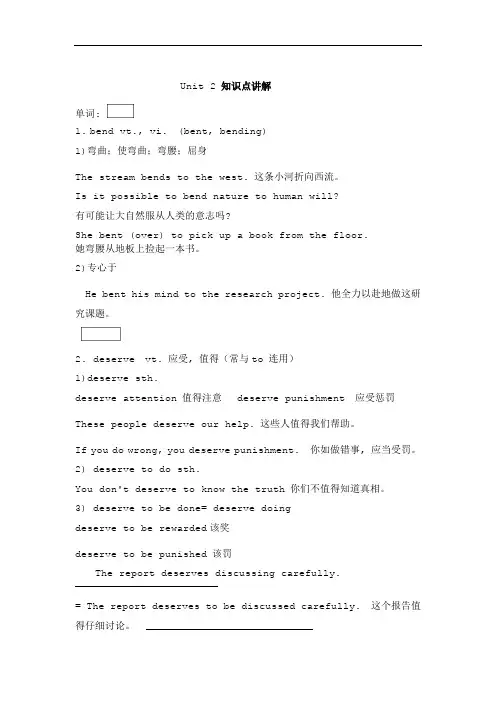
Unit 2 知识点讲解单词:1.bend vt., vi. (bent, bending)1)弯曲;使弯曲;弯腰;屈身The stream bends to the west. 这条小河折向西流。
Is it possible to bend nature to human will?有可能让大自然服从人类的意志吗?She bent (over) to pick up a book from the floor.她弯腰从地板上捡起一本书。
2)专心于He bent his mind to the research project. 他全力以赴地做这研究课题。
2. deserve vt. 应受, 值得(常与to 连用)1)deserve sth.deserve attention 值得注意 deserve punishment 应受惩罚These people deserve our help. 这些人值得我们帮助。
If you do wrong, you deserve punishment. 你如做错事, 应当受罚。
2) deserve to do sth.You don't deserve to know the truth 你们不值得知道真相。
3) deserve to be done= deserve doingdeserve to be rewarded该奖deserve to be punished 该罚The report deserves discussing carefully.= The report deserves to be discussed carefully. 这个报告值得仔细讨论。
3. expect vt. expect (sb.) to do sth.1) 预料;预期I expect he'll pass the examination. 我预料他会通过考试。
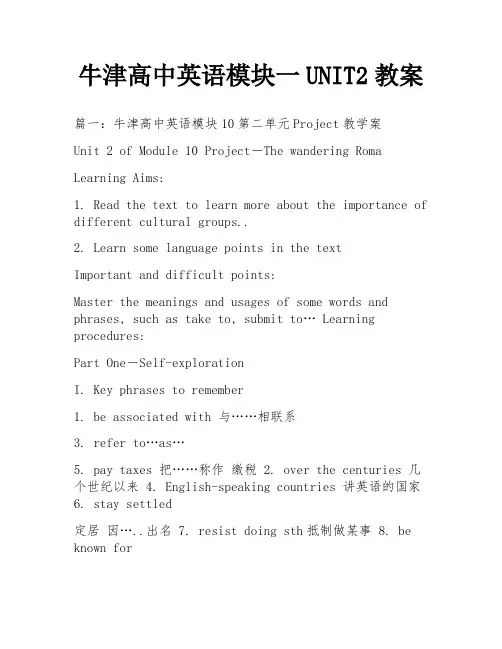
牛津高中英语模块一UNIT2教案篇一:牛津高中英语模块10第二单元Project教学案Unit 2 of Module 10 Project-The wandering Roma Learning Aims:1. Read the text to learn more about the importance of different cultural groups..2. Learn some language points in the textImportant and difficult points:Master the meanings and usages of some words and phrases, such as take to, submit to… Learning procedures:Part One-Self-explorationI. Key phrases to remember1. be associated with 与……相联系3. refer to…as…5. pay taxes 把……称作缴税 2. over the centuries 几个世纪以来 4. English-speaking countries 讲英语的国家6. stay settled定居因…..出名 7. resist doing sth抵制做某事 8. be known for11. way of life 生活方式9. predict one’s future 预测某人的未来10. show respect for尊重……12. collision of cultures 文化冲突14. take action against sb 采取行动抵制某人 13. gain a reputation as…得到……名声15. ban…from doing sth 禁止…做某事 16. break up one’s family 分裂某人家庭17. be forbidden from doing sth 被禁止做某事18.classify…as… 把……分类为……19. in large numbers 大量地 20.at best至多22.have prejudice against…对……产生偏见 21. feel sympathy for对……感到同情II. Fast reading1. What is this article aimed to do?To explain the history of the Romany and some of the reasons for their movement.2. What are the places the Romany have traveled?India, Egypt and some European countries.3. What are some modern nations trying to do?Some modern nations are now trying to help the Romany preserve their history, language and culture.III. Enjoy the following sentences and fill in each blank with a proper word.1. No group ________ ________ ________ (紧密相连) moving and travelling more than the Roma, who ________ ________ ________ (已经漫游在) Europe and Asia for nearly 1,000 years.(Lines1-2)2. They ________ ________ (抵制建造) permanent homes, and choose not to bee citizens of countries __________________ _________ __________(他们所到的).(Lines17-18)13. Their main characteristic is that they donot________ ________ ________ ________ ________________ ________(长期定居), and always move on to another place.(Lines14-15)4. During World War II, the Romany, ________________(以及)gays and Jews,________ ________________(生活在恐惧中). The Nazis a ________them________(列为) a dangerous group, and followed a systematic policy of hunting and killing them________ ________ _________(大量).(Lines45-48)5. It both makes us _______ ________ _________(同情)them, and also makes us think about why we ________ ________ ________ ________ ________(往往产生偏见)other people just because they have a differentculture or a different ________ _______ ________(生活方式).(Lines56-58)IV. Fill in the blanks according to the text.2V. Reading prehension1. What’s the main idea of the passage?A .The history of the Roma and the reasons for their movement.B. The relationships between the Roma and other countries.C. How the Roma are organized.D. How international organizations help the Roma.2. Which of the following is NOT true?A .The Roma speak the same language.B. The Roma had to move because they had no skills to support themselves.C. The Roma are not obedient.D. The Roma like to keep close relations.3. Wh at about the modern people’s attitude towards the Roma?A. They hate them.B. They have begun to accept them. D. They are frightened of them.C. They are plotting to wipe them out.VI. Self-study f important and difficult language points.1.[原句回放]With their frequent movements, they thieves, who people moved away, and were then difficult to find.句子中的gained a reputation as的意思是 __获得….作为…的名声________________ 。
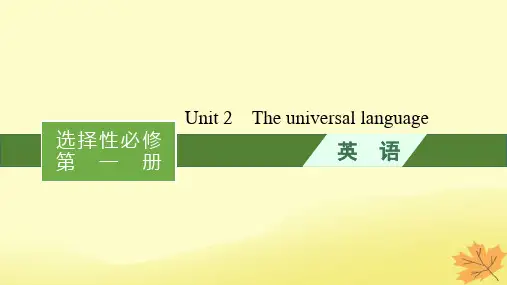
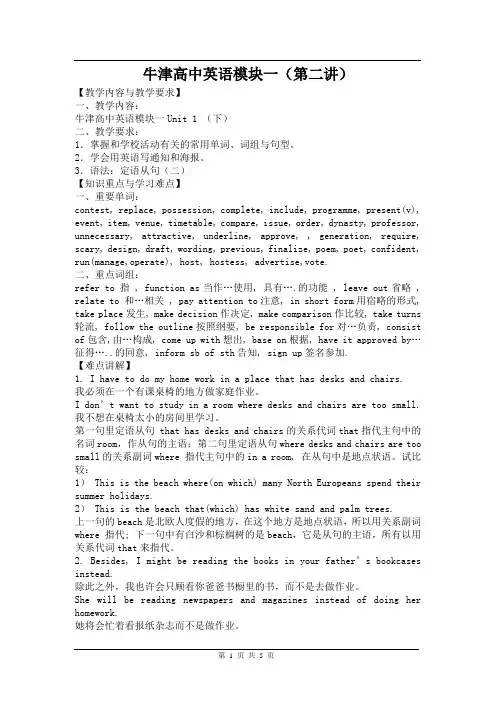
牛津高中英语模块一(第二讲)【教学内容与教学要求】一、教学内容:牛津高中英语模块一Unit 1 (下)二、教学要求:1.掌握和学校活动有关的常用单词、词组与句型。
2.学会用英语写通知和海报。
3.语法:定语从句(二)【知识重点与学习难点】一、重要单词:contest, replace, possession, complete, include, programme, present(v), event, item, venue, timetable, compare, issue, order, dynasty, professor, unnecessary, attractive, underline, approve, , generation, require, scary, design, draft, wording, previous, finalize, poem, poet, confident, run(manage,operate), host, hostess, advertise,vote.二、重点词组:refer to 指 , function as当作…使用, 具有….的功能 , leave out省略 , relate to 和…相关 , pay attention to注意, in short form用宿略的形式, take place发生, make decision作决定, make comparison作比较, take turns 轮流, follow the outline按照纲要, be responsible for对…负责, consist of包含,由…构成, come up with想出, base on根据, have it approved by…征得…..的同意, inform sb of sth告知, sign up签名参加.【难点讲解】1. I have to do my home work in a place that has desks and chairs.我必须在一个有课桌椅的地方做家庭作业。
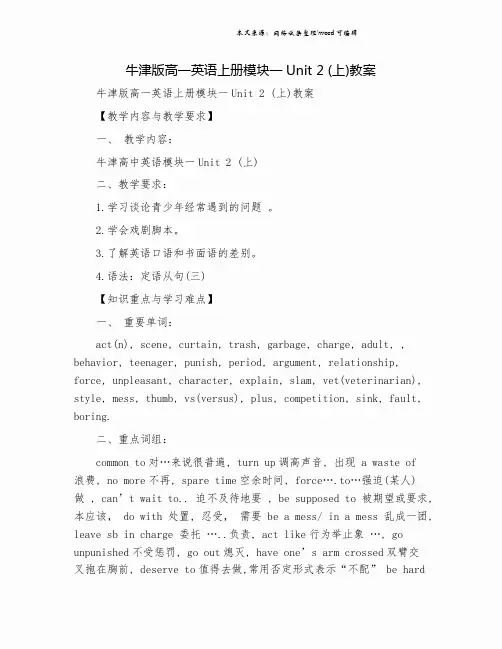
牛津版高一英语上册模块一Unit 2 (上)教案牛津版高一英语上册模块一Unit 2 (上)教案【教学内容与教学要求】一、教学内容:牛津高中英语模块一Unit 2 (上)二、教学要求:1.学习谈论青少年经常遇到的问题。
2.学会戏剧脚本。
3.了解英语口语和书面语的差别。
4.语法:定语从句(三)【知识重点与学习难点】一、重要单词:act(n), scene, curtain, trash, garbage, charge, adult, , behavior, teenager, punish, period, argument, relationship, force, unpleasant, character, explain, slam, vet(veterinarian), style, mess, thumb, vs(versus), plus, competition, sink, fault, boring.二、重点词组:common to对…来说很普遍, turn up调高声音, 出现 a waste of浪费, no more不再, spare time空余时间, force….to…强迫(某人)做, can’t wait to.. 迫不及待地要 , be supposed to被期望或要求, 本应该, do with 处置, 忍受,需要 be a mess/ in a mess乱成一团, leave sb in charge 委托…..负责, act like行为举止象…, go unpunished不受惩罚, go out熄灭, have one’s arm crossed双臂交叉抱在胸前, deserve to值得去做,常用否定形式表示“不配” be hardon对某人苛刻, now that既然, in the form of以的形式, than ever before比以前任何时候都, be angry at对某事生气, even if即使, treat sb like…象一样对待 , argue about为…而争吵, the cause of起因, differ in many ways在许多方面不同, fit badly非常不合身。
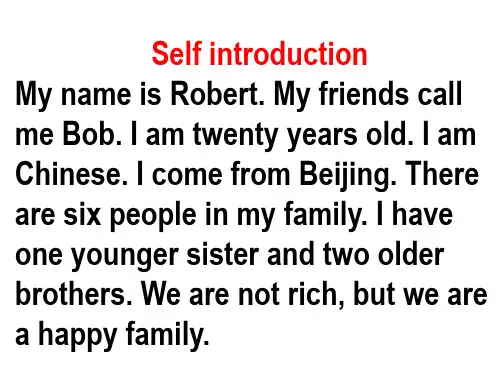
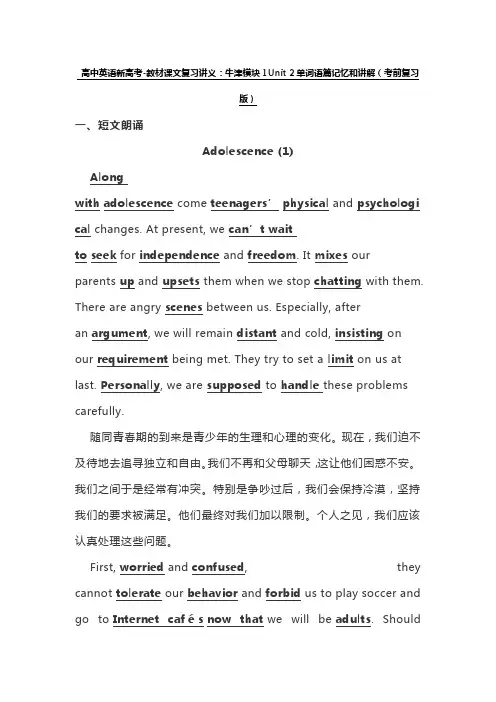
高中英语新高考-教材课文复习讲义:牛津模块1Unit 2单词语篇记忆和讲解(考前复习版)一、短文朗诵Adolescence (1)carefully.随同青春期的到来是青少年的生理和心理的变化。
现在,我们迫不及待地去追寻独立和自由。
我们不再和父母聊天,这让他们困惑不安。
我们之间于是经常有冲突。
特别是争吵过后,我们会保持冷漠,坚持我们的要求被满足。
他们最终对我们加以限制。
个人之见,我们应该32. Everyone should be allowed freedom of choice.每个人都应享有自由选择的权利。
33. Local people are worried by the rise in crime.当地人因犯罪活动有所抬头而忧心忡忡。
34. Bad books do more harm to people than bad friends. 壞書比壞朋友害處更大。
35. It is clear that smoking is harmful to health.很明显,抽烟对健康有害。
36. It would be foolish of you to change your mind now. 现在改变主意非常愚蠢。
37. It takes time and patience to photograph wildlife. 拍摄野生动物要肯花时间,要有毅力。
38. It was selfish of him to leave all the work to you. 他把所有的工作都推给你,真是自私。
39. The time we spent together is now a distant memory. 我们一起度过的时光现已成为久远的记忆。
40. I was so annoyed with him for turning up late.他姗姗来迟,我很生气。
41. He is forbidden from leaving the country.他被限制出境。
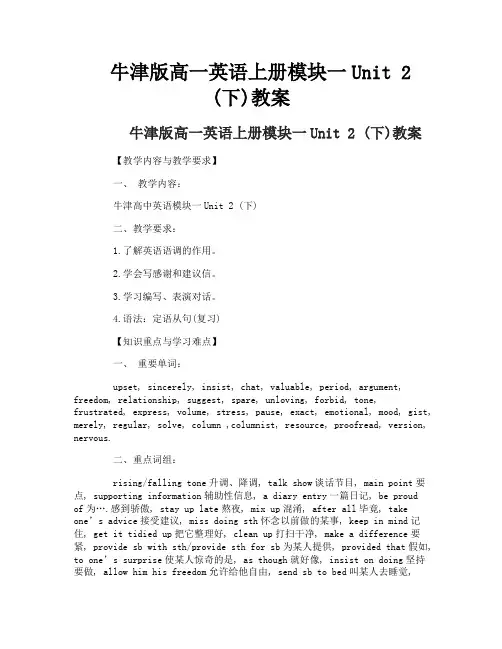
牛津版高一英语上册模块一Unit 2(下)教案牛津版高一英语上册模块一Unit 2 (下)教案【教学内容与教学要求】一、教学内容:牛津高中英语模块一Unit 2 (下)二、教学要求:1.了解英语语调的作用。
2.学会写感谢和建议信。
3.学习编写、表演对话。
4.语法:定语从句(复习)【知识重点与学习难点】一、重要单词:upset, sincerely, insist, chat, valuable, period, argument, freedom, relationship, suggest, spare, unloving, forbid, tone, frustrated, express, volume, stress, pause, exact, emotional, mood, gist, merely, regular, solve, column ,columnist, resource, proofread, version, nervous.二、重点词组:rising/falling tone升调、降调, talk show谈话节目, main point要点, supporting information辅助性信息, a diary entry一篇日记, be proudof为….感到骄傲, stay up late熬夜, mix up混淆, after all毕竟, take one’s advice接受建议, miss doing sth怀念以前做的某事, keep in mind记住, get it tidied up把它整理好, clean up打扫干净, make a difference要紧, provide sb with sth/provide sth for sb为某人提供, provided that假如, to one’s surprise使某人惊奇的是, as though就好像, insist on doing坚持要做, allow him his freedom允许给他自由, send sb to bed叫某人去睡觉,forbid sb from doing sth禁止某人做某事, assign roles to分派角色, argue about sth with sb为某事和某人争吵.【难点讲解】1. They are meant to be read aloud, and often use less formal language than other type of writing.剧本是要被朗读的,它使用的语言没有其他文体那么正式。
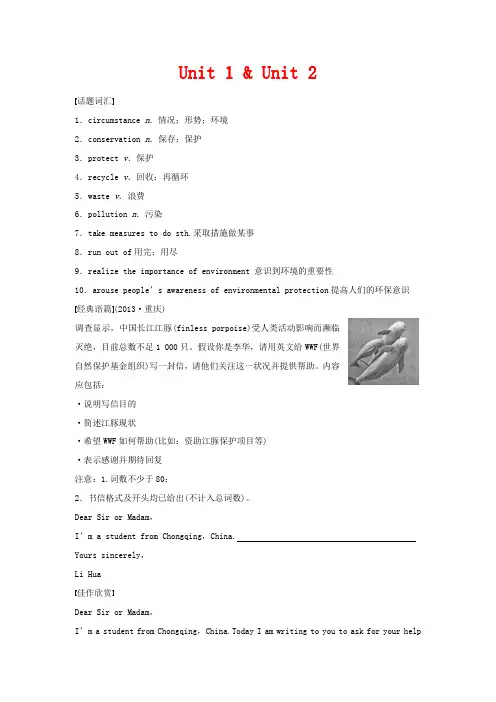
Unit 1 & Unit 2话题词汇1.circumstance n.情况;形势;环境2.conservation n.保存;保护3.protect v.保护4.recycle v.回收;再循环5.waste v.浪费6.pollution n.污染7.take measures to do sth.采取措施做某事8.run out of用完;用尽9.realize the importance of environment 意识到环境的重要性10.arouse people’s awareness of environmental protection提高人们的环保意识经典语篇(2013·重庆)调查显示,中国长江江豚(finless porpoise)受人类活动影响而濒临灭绝,目前总数不足1 000只。
假设你是李华,请用英文给WWF(世界自然保护基金组织)写一封信,请他们关注这一状况并提供帮助。
内容应包括:·说明写信目的·简述江豚现状·希望WWF如何帮助(比如:资助江豚保护项目等)·表示感谢并期待回复注意:1.词数不少于80;2.书信格式及开头均已给出(不计入总词数)。
Dear Sir or Madam,I’m a student from Chongqing,China. Yours sincerely,Li Hua佳作欣赏Dear Sir or Madam,I’m a student from Chongqing,China.Today I am writing to you to ask for your helpto improve the situation the finless porpoise is faced with in the Yangtze River. Because of the behavior of our human beings,the finless porpoise in the Yangtze River has been greatly influenced and will be endangered.①According to the report,its total number is less than 1,000 now.② In order to prevent them from dying out,we have founded a project,but we have difficulty in running it for lack of fund. If you would like to help,you can provide it with necessary money.Besides,you can give us relevant training in protecting them.With your help,we believe we can improve the living environment of the finless porpoise soon,thus increasing its number.③If we can get you help,we will be very thankful.④We’re looking forward to your early reply.Yours sincerely,Li Hua思维发散1.用定语从句合并第①、②两句As is reported,the finless porpoise in the Yangtze River,whose total number has been reduced to less than 1,000,has become endangered due to human activities. 2.仿照第③句用现在分词作结果状语完成句子明年在北京有更多的孩子到了上学的年龄,这导致首都小学教师短缺。
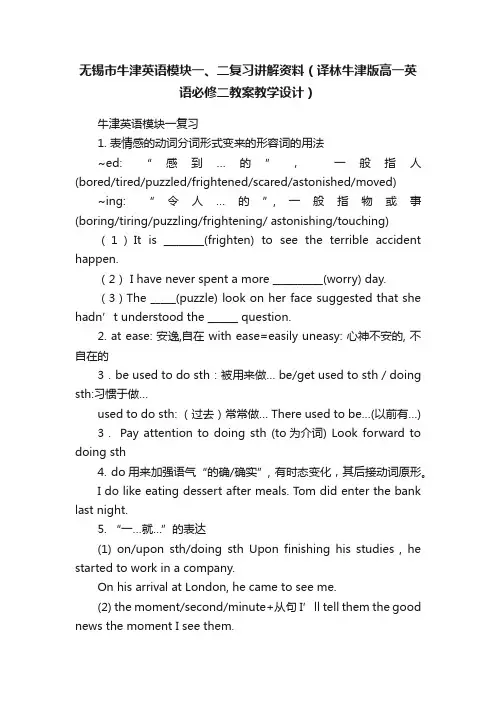
无锡市牛津英语模块一、二复习讲解资料(译林牛津版高一英语必修二教案教学设计)牛津英语模块一复习1. 表情感的动词分词形式变来的形容词的用法~ed: “感到…的”,一般指人(bored/tired/puzzled/frightened/scared/astonished/moved) ~ing: “令人…的”,一般指物或事(boring/tiring/puzzling/frightening/ astonishing/touching) (1)It is ________(frighten) to see the terrible accident happen.(2) I have never spent a more __________(worry) day.(3)The _____(puzzle) look on her face suggested that she hadn’t understood the ______ question.2. at ease: 安逸,自在 with ease=easily uneasy: 心神不安的, 不自在的3.be used to do sth:被用来做… be/get used to sth / doing sth:习惯于做…used to do sth: (过去)常常做… There used to be…(以前有…) 3.Pay attention to doing sth (to为介词) Look forward to doing sth4. do用来加强语气“的确/确实”, 有时态变化,其后接动词原形。
I do like eating dessert after meals. Tom did enter the bank last night.5. “一…就…”的表达(1) on/upon sth/doing sth Upon finishing his studies , he started to work in a company.On his arrival at London, he came to see me.(2) the moment/second/minute+从句I’ll tell them the good news the moment I see them.(3) immediately+从句 I heard the phone ring immediately I opened the door.6.状语从句中的“主语+be” 的省略情况一:主从句主一语一致时 When/while doing sth:在做…的同时Even if invited, I won’t go to her party.(=even if I am invited) If disturbed by noises, the animals will act strangely.(=if the animals are disturbed…)情况二:if/when (it is)possible/necessary; if (it is) so/notYou should look the new words up in the dictionary when necessary.7.下列词用作系动词的用法注意:系动词一般接形容词不接副词,不接宾语,无被动,无进行时He remains weak in Englishstay slim/young/ fresh/cold/clean/healthygomissing/unpunished/hungry/mad/wild/bad/wrong/red/pale His idea proved (to be) impractical.8. get+ done: 可看作一种被动语态get done/finished/turned upside down/dressed/changed/married9. marry sb: 嫁给/娶某人(短暂动作) get married:成婚(短暂动作)be married to sb:与某人结婚(延续状态)10.“提供” 的表达比较: Supply sth to sb / provide sth for sb;Supply/provide sb with sthOffer sb sth=offer sth to sb:主动提出(帮助/建议等)11.as if/though+从句: “好象” (根据情况选用陈述语气或虚拟语气)Even if/though+从句:“既使”12.“可是/然而”的表达: but:并列连词,只能放在分句之前,无“,”however:副词,位置灵活,其后有“,”though: 一般置于句末时,才用作此意. The film is moving. It is a little long, though.while:侧重表“对比” She was busy preparing supper, while her husband was watching TV.13.manage to do sth:设法做了某事(强调结果) = succeed in doing sthtry to do sth:尽力做某事 try doing sth:试着/图做某事15.注意下列名词一般只用作不可数名词Fun: Fishing is great fun. It sounds fun.Advice: He gave me lots of useful advice on how to learn English well.A great deal of informationHe has made such great progress that we all envy him.2 pieces of evidence,3 pieces of equipment16. clothes: 一般看作复数(an article of clothes ) Cloth:布匹Clothing: “着装”的总称an article of clothing Clothing and food are our daily necessities.17.“参加/加入”的表达Attend a meeting/a lecture/school/classes(开会/上学/听讲座) Take part in the Olympics/after-school activities(参加一些大型的正式的活动)Join in our talk/discussion(参加一些日常的活动)Join sb in sth/doing sth:加入某人一起活动Join sb/ a club/the army/a group(参加组织/团体)18.“因为/由于”的表达Because/since/as/now that/for+分句Because 最正式,可回答“why…?”as: “由于”,表示一种“客观”原因语气较because 弱Since/now (that): “即然”,表示一种“双方皆知的/理所当然的”原因Now that you have finished your work, let’s go out to play football.For: 表示“补充/推断”的原因,一般放在主句之后They can’t have gone, for the light is still onBecause of/owing to/due to/thanks to+词/组20.With sb/sth doing sth(在做) / to do(要做) / done(已被)There be sb/sth doing/to do /done(同上)21. hear/see/find( 感官动词) sb/sth doing sth(正在做) / do sth(做了) / done(被)被动式:be heard/seen doing sth / to do sth(被动需加“to”)/ doneThe missing boy was last seen playing by the river.Tom was heard to open the door and enter the room.The boy was seen bitten by a dog.22. (1) have sb do sth = let sb do sth 比较: get sb to do sthWho would you rather have post the letter for you?(2) have sb/sth doing sth:听任/任由某人/物…; 听任某人/物长时间地…We won’t have that happening again.The workers have the machines running day and night.(3) Have sth done: 让某事/物被… get sth doneThe machine that they had had repaired went wrong again.The people living by the airport often have their hearing harmed.23. leave/keep sb/sth doing sth(主动) / done(被动)I’m terribly sorry to leave you standing outside so long.They went out to playing leaving the work unfinished.Leave sb/sth+介短: “把…忘在…” I’m sorry that I have forgotten your book in the park.25. earn money/a living, earn sb sth (His success earned him great respect from others)27. prepare lessons/supper(备课/烧饭) prepare for the coming exam prepare sb for sthbe (well/poorly) prepared for sth: 为…作好了准备make preparations for sth=prepare for sth, in preparation for…为...准备28.develop an interest in; develop a good habit (培养/养成) 29.regret to do sth:遗憾要做某事; regret doing sth:后悔做了某事30. inform sb of sth→be informed of sth; inform sb that +从句32. require sb to do sth→be required to do sth; require that…(should) do sthrequire sth of sb We did all that was required of us.33.act in a play/film; act the part of Zhou Enlai ; act as:作为/充当34. be in charge of…/take charge of…:负责…; be in the charge of…:由…负责Charge (sb) money for sth/doing sth(收费); free of charge=for free35. bring…under control,lose control of…比较:be in control of…:控制… ; be in the control of…:由…控制36. the reason for sth/doing sth the cause of…: …的起因The reason why+从句is that…从句 For the following reasons / no reason;37.下列情感动词用作及物动词(please/interest/excite/puzzle/astonish/surprise sb)It is impossible to please everybody. What she said interested us greatly.38.Close/deep/wide/high: 用作副词时,指具体的“近/深/宽/高”get close to, dive deep into the sea, open his eye wide, fly high in the skyclosely(严密地/细致地),deeply(深深地),widely(广泛地), highly(高度地): 指抽象的…watch closely,deeply moved by his words, widely used, think highly of39. explain sth to sb; explain to sb sth40. insist on doing sth; insist that…(should)do: 坚决要求…, insist that从句(一般用法):坚持认为41. 比较:suggest(暗示/表明)+that 从句(一般用法,陈述语气)suggest(建议) that…(should) do sth suggest sb/one’s doing sthadvise that …(should) do sth advise sb to do sth;42.give sb some advice(不可数)on…; ask (sb) for advice; take/follow one’s advicemake some suggestions(可数)44. contain: 包含/容纳(侧重于指内容/成分)Include: 包括(侧重于指整体与个体)作状语:including sb/sth = sb/sth included45. work(v):行得通,有作用/效果Your idea won't work in practice.46.protect…from/against sth/doing sth: 保护…免受…prevent …from sth/doing sth: 预防/阻止…做stop…(from)doing sth / keep sb from doing sth47.forbid sb to do sth / forbid sb from doing sth:禁止某人做某事forbid doing sth48. 考虑: consider doing sth认为:consider sb to do sth→be considered to do sth ;consider sb/sth (to be/as)…49.take a risk; risk one’s life,risk doing sth50. recognize sb/sth:辨认出(~ her voice on the phone)recognize sb as…:公认/认可某人…→be recognized as…51.接不可数名词:a great/good deal of; a good amount of 接可数复数: a large number of, a great many皆可: a lot of=lots of; plenty of52. search sb/sp:搜查/身,search for…:寻找(search sb/sp for…);in search of: (为了)寻找53. research into…:探讨/调查 do some research on54. There is a/no possibility that…从句 / of sth55. case :案子/病例The case against her will be heard tomorrow. 3 cases of SARScase:情况 in that/this case:在那/这种情况下比较: in case +从句; in case of sth56. state:州;国家(侧重于指政府) state:状态/况 in a state of disorderState (v) one’s opinion on…: 陈述对于…的观点57. in support of…:支持 He has a large family to support(v. 赡养/养活)58. envy sb sth:羡慕/妒嫉 I don't envy you your journey in this bad weather.envy(n) : 羡慕/忌妒的根由/对象 He has become an envy of all his friends.59. reach sp:抵达某地reach for…:伸手去拿/够… within/out of/beyond one’s reach60.Claim to do sth:宣称要做… claim against damage=makea claim for damage:要求赔负损失61. in the form of..:以…的形式 form(vt)a group/ the good habit of… (组建,养成)62. set sail for sp; leave for sp; set off for sp63. be present at a meeting/a party:出席/参加 the people present:在场的人64. result in:导致/引起(=cause/lead to) result from:由…造成/引起As a result: 因此 as a result of:因为…65. “确定的” It is certain that…. Sb is sure/certain that…(sure只能指人)66.把…与…相比: compare… with/to… 与…相比而言(作状语): compared with…把…比作…: compare…to…67. have sth/nothing in common (with…):(与…)有/无共同之处have sth/nothing to do with…: 与…有/无关68. survive(vt) sth: 幸免于/经受住( The house survived the storm.)69. pick:挑选 He picked a book to read. (=choose) pick out: 挑选出Pick apples/tomatoes/cotton:采/摘 pick a pocket:扒窃Pick up:捡起;(无意中)学到/得到/买到/染上; 增加/改善; 收听~a valuable stamp at a sale; ~ health/speed; ~ English programs70. Prove(实义动词) : prove sb/sth/one self (to be)…; prove sth/ that…从句He proved himself worthy of confidenceProve(系动词,无被动): prove (to be)+adj/n The method proved (to be) highly effective.71. live one’s dream/faith:(在生活中)实行/践梦想/信念live up to:真正做到/生活得无愧于 We will live up to what our parents expect of us.72. host (vt)a program the Olympics:主持/主办 host(n):主人/主持人/东道主73.Be supposed to do sth=should do sth; be supposed to have done =should have done :“本应…”They were supposed to have come an hour earlier, but they were late.74.What… do with sth? How…deal with sth?75. 比较:All the light went out. go out(vi) :熄灭All the lights were turned off. turn off(vt):关掉76. work out(vt) the total cost(解决/算出) work out(vi):锻炼/结果 Things worked out very well.rule out the possibility:排除 look into a room/ the cause of the accident:朝…看;调查step up(vt) the training: 加紧/促进 show up=turn up:出现/露面make up:组成/构成;编造,补偿 ~ a medical team/50% of the population/ a story/for the lost time77. after all:毕竟/终究above all:首要的是in all:总之/共(not)…at all(根本)78.count(v):数/算数count down(倒数/计时);有效/重要(Every minute counts)80. as well as…:以及/包括 as well=too:用于句末81. pay off(vi): 成功/得到好结果 pay off(vt) debt: 还清(债务)Part Three: 语法重难点一、有关定语从句的一些要点I. 只能用“that” 的情况1.先行词为anything/everything/all/any/little等不定代词时注:有时all/everything/anything + that定语从句= what+名词性从句(如宾语从句)We’ll do all (that) we can to help you (= what we can)The way he solved the problem was different from what we were used to.(=the way that we were used to)2.先行词前有序数词,最高级,all /any / the very / the right / the only修饰时3.先行词既有人又有物时We talked about the things and teachers that we all knew.4.引导词在从句中作表语时My hometown is no longer a small village that it used to be.(that在从句中做表语)5.避免重复时 Who is the person that you want to see.II. 不能用that 的情况1. 介词之后 The prize for which he worked so hard was a new bicycle.2. 非限制性定语从句中,“,”之后Football, which is a very interesting game, is played all over the world.III. whose的使用:既指人又指物,替代his, her, their, its及名词所有格(如:Tom’s/the school’s)The book, whose cover is broken, is not mine. (=the cover of which = of which the cover)IV. 先行词为表时间/地点/原因的名词时,用where, when, why 还是用that/which若从句中被替代部分:作主语或宾语,用that/which;作状语, 用where/when/why (往往=“介词+which”)1.My sister works in a beautiful city, _where_there are a lot of parks. (=in which)2.The place_that/which_ interests the children most is Disneyland.(从句中作主语)3.I often thought of my childhood, when I lived on a farm. (替代in my childhood)4.Next winter,__which you’ll spend in Harbin, I’m sure, will be an exciting holiday.(作spend的宾语)5.Mary had to go to Beijing on business on June15, which happened to be her son’s birthday.(作主语)6.This is the very reason __that_ you all know. (作know的宾语)V. as引导的定语从句, which指代一句话/一件事1.the same/as/such/so…as(定语从句): 先行词前有“such/ so, the same/as ”修饰时,定语从句用“as”引导★ 比较:such /so…+名词+as ( 定语从句, as起替代作用,从句结构不完整“象/如…的…”)such /so…+名词+that (状语从句,从句结构完整“如此…以致于…”)Please lend me the same tool as was used the other day.Mr. Wang is so good a teacher as all the students love and respectMr. Wang is such a good teacher that all the students love and respect him2.as引导非限制性定语从句,指代逗号前后的整个句子,可置于句首、句中或句末。
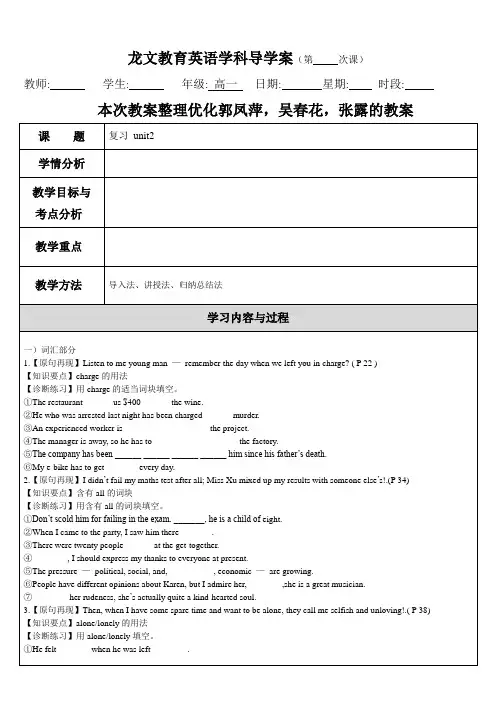
Module1 Unit1教学设计课题AWE M1 U2 主备人邱东课时主备教案课型Welcome + WordpowerLearning objectives:By the end of this period, students will be able to1. enlarge their own knowledge by knowing the differences between American English and British English in pronunciation, grammar, vocabulary and spelling;2. improve their spoken skills by describing their own experiences or speaking about what they have heard or seen in the past tense;3. be aware of the sense of language by learning some English colloquialisms. Focus of the lesson:1. relations between parents and teenagers2. differences between American English and British English3. different colloquialismsPredicted area of difficulties:1. how to improve the relationships between parents and teenagers if they are not so good;2. how to use colloquialisms properly.Learning aids:1. PPT2. blackboardLearning procedures:课型Reading(I)Learning objectives:By the end of this period, students will be able to1. know more information about American family life;2. learn the basic skills of how to read a play and act out the play with the help of a teacher;3. form a positive attitude towards growing pains.Focus of the lesson:1. characteristics of a play;2. a performance of a play; Predicted area of difficulties:How to act in the play? Learning methods:1. PPT2. blackboardLearning procedures:课型Reading(II)Learning objectives:By the end of this period, students will be able to1. write out the transformation of the key words and phrases correctly;2. use the key words properly in relevant tasks;3. know some words and phrases in a play;4. raise the awareness of learning new words or phrases in a context. Focus of the lesson:1. usage of the key words and expressions;2. verb tenses in a play and some stage instructions.Predicted area of difficulties:1. the usage of the following words and phrases ‘follow’‘be supposed to do’‘tolerate ‘deserve’and so on;2. the proper usage of relative adverbs.Learning aids:1. PPT2. blackboardLearning procedures:课型Grammar & UsageLearning objectives:By the end of this period, students will be able to1. better understand the grammatical functions of attributive clauses;2. use prepositions +which / whom3. use relative adverbs ‘when’‘where’‘why’;4. enjoy the neatness & beauty of attributive clauses comparing them with simple sentences.Focus of the lesson:1. the usage of relative adverbs;2. the exchange of “prepositions +which”and relative adverbs.Predicted area of difficulties:1. the usage of relative adverbs;2. how to distinguish relative pronouns and relative adverbs.Learning aids:1. PPT2. blackboardLearning procedures:课型TaskLearning objectives:At the end of this lesson, students will be able to:1. understand the main points and the mood of the writer by reading four diary entries.2. know how to write a letter for advice and a letter of reply.3. know a better way to solve the problem between teenagers and parents. Focus of the lesson:Reading for key points and main idea.Predicted learning difficulties:How to get the key points in a diaryLearning aids:1. PPT2. blackboardLearning procedures:课型ProjectLearning objectives:By the end of this period, students will be able to:1. know what are growing pains;2. identify the three types of changes of growing pains;3. learn to deal with the changes properly and develop healthily both physically and mentally.Focus of the lesson:1. three kinds of changes;2. proper ways to deal with them;Learning aids:1. PPT2. blackboardLearning procedures:。
高中英语新高考-教材课文复习讲义:牛津模块1Unit 1单词语篇记忆和讲解(考前复习版)7. Good listening can always show respect, promote understanding, and improve relationship.良好的倾听总能表示出尊敬并促进了解,从而改善人际关系。
8. Children should treat their parents with respect. 孩子们应该尊敬他们的父母。
9. If you have a job, devote yourself to it and finally you’ll succeed.如果你有一份工作,集中精力做好它,最终你会成功的。
10. On average, men still earn more than women.平均来看,男性仍比女性挣得多。
11. These marks are well above/below average. 这些分数远在一般水平以上/以下。
12. It's going to be a struggle (=difficult) to get your ideas accepted.要使人们接受你的想法将会非常困难。
(对某人而言)是困难(费劲)的事13. I've been struggling to understand this article all afternoon.我琢磨了一个下午,想弄懂这篇文章的意思。
14. I also had friends who gave me a great deal of encouragement...我还有些朋友给了我很多鼓励。
15. Drivers are advised to take extra care .建议驾驶员开车要格外小心。
16. I'd grown fond of the place and it was difficult to leave.我已渐渐爱上这个地方,舍不得离开了。
高中英语新高考-教材课文复习讲义:牛津模块2Unit 1单词语篇记忆和讲解(考前复习版)很多难以解释的故事或事件常常让我们困惑。
其中的一些毫无事实根据,因为它们的幽默会给我们带来笑声。
以神农架的野人为例。
人们普遍认为,它们在中国西北很早就出现了,也许和我们的祖先在某些方面是有联系的,有着惊人的体力。
很多目击者说他们仍然活着,住在自然保护区。
人们未曾想到它们竟然对我们会造成伤害。
但是就在上个月,据报道两个野人前往居民居住的地方且攻击他们,这是由于人类加大努力去跟踪它们。
当地的一个著名的侦探负责这个案件,仔细调查了证据。
突然一个想法划过他的大脑:这个故事可能就是某些记者编造的。
他怀疑结果的准确性并排除了所有的可能性。
即便如此,人们还是很感兴趣。
到底正确与否仍然还是一个谜。
二、重点句子背诵:1. One particular incident sticks in my mind. 有一件事我总忘不了。
2. She had a puzzled look on her face. 她满脸困惑的表情。
3. Their relationship was based upon mutual respect.他们之间的关系以相互尊重为基础。
4. One's success is based on how hard he has tried. 一个人的成功基于他的努力程度。
5. Laughter is the best medicine. 欢笑是良药。
6. Thousands of refugees are making their way across the border. 成千上万的难民正在越过边境。
7. At the end of the book, Betsy sets off to make her way in the world. 在书的结尾,贝特西开始获得成功。
8. Mark Twain has been called the inventor of the American novel. And he surely deserves additional praise: the man who popularized the clever literaryattack on racism.马克·吐温被称作美国小说的创始人。
高中英语新高考-教材课文复习讲义:牛津模块1Unit 2单词语篇记忆和讲解(考前复习版)一、短文朗诵Adolescence (1)carefully.随同青春期的到来是青少年的生理和心理的变化。
现在,我们迫不及待地去追寻独立和自由。
我们不再和父母聊天,这让他们困惑不安。
我们之间于是经常有冲突。
特别是争吵过后,我们会保持冷漠,坚持我们的要求被满足。
他们最终对我们加以限制。
个人之见,我们应该we become selfish and are easily annoyed for lack of patience and wisdom.首先,父母因为着急和困惑难以忍受我们的行为,并因为我们快要是成年人了禁止我们踢足球和去网吧。
倘若真有急事,我们会害怕。
在他们眼里,我们自私、没有耐心和缺乏智慧因而易燥。
二、词汇(Reading):请结合例句中的词汇搭配用法朗诵句子1. I was frightened of being left by myself in the house.我害怕一个人被留在屋里。
2. He told this to somebody else, not realizing that he was not supposed to.他不知道这些话不该告诉别人,结果告诉别人了。
3. He was supposed to have told me about it. 他本应该把这件事告诉我的。
4. They'll either die from the cold or starve to death.他们要么会被冻死,要么会被饿死。
5. People starved of sleep start to lose their concentration.睡眠严重不足的人开始注意力不集中。
6. She felt very tired, and her spirits sank.她感到筋疲力尽,情绪低落。
7. She refused to tolerate being called a liar. 她拒不接受被称为撒谎者。
8. It is important to reward good behaviour .好的行为要给予奖励,这是很重要的。
is foolish to sigh for our failure often because it will do harm to us.我们竭力辩护我们的行为。
他们总是对我们挑刺,非常粗鲁。
我们渴望永恒持续的友谊。
而且,我们真的很勤奋,我们的努力理应有赞扬。
但是,因为犯下的一些粗心的错误我们被责怪。
我们感到误解。
幸好,在老师的指导下,事情很快回归正常。
我们被告知要在学习和娱乐中取得平衡。
经常为失败去叹息是愚蠢的,因为对我们有害。
Anyhow, we should rise to challenges and act as if no one watched us. Adolescence is a time of struggle. Upon its coming to an end, a new beginning is on the way.无论如何,我们要迎难而上,就像无人观察我们去做事。
青春期是拼搏的岁月。
一旦它要结束,新的起点就要来临。
二、词汇(Project):请结合例句中的词汇搭配用法朗诵句子27. Traditional classes provide an environment where you can practice under the guidance of someone who’s good at the language. 传统的课堂提供一种环境,在其中你可以在某个擅长于这种语言的人的指导下练习。
[安徽]28. She insisted that we stay at her house instead of a hotel. 她执意要我们住她家而不住酒店。
29. Why do you insist on leaving your dirty clothes all over the floor? 你为什么总把脏衣服弄得满地都是?30. It is no use arguing with people who won't see reason.跟不讲道理的人辩论是没有用处的。
31. I don't think that's a very strong/ powerful argument.我认为这个论点不太站得住脚/有说服力。
32. Everyone should be allowed freedom of choice.每个人都应享有自由选择的权利。
33. Local people are worried by the rise in crime.当地人因犯罪活动有所抬头而忧心忡忡。
34. Bad books do more harm to people than bad friends. 壞書比壞朋友害處更大。
35. It is clear that smoking is harmful to health.很明显,抽烟对健康有害。
36. It would be foolish of you to change your mind now. 现在改变主意非常愚蠢。
37. It takes time and patience to photograph wildlife. 拍摄野生动物要肯花时间,要有毅力。
38. It was selfish of him to leave all the work to you. 他把所有的工作都推给你,真是自私。
39. The time we spent together is now a distant memory. 我们一起度过的时光现已成为久远的记忆。
40. I was so annoyed with him for turning up late.他姗姗来迟,我很生气。
41. He is forbidden from leaving the country.他被限制出境。
42. A survey showed people were confused about what they should eat to stay healthy.一项调查表明,人们对该吃什么才能保持健康这个问题感到困惑。
43. She lost her job when the factory closed, along with hundreds of others.工厂倒闭,她和他人一样失去工作。
44. Young people often feel misunderstood.年轻人往往觉得被人误解45. It’s normal for couples to argue now and then.夫妻之间偶尔发生口角是很平常的。
46. Be careful not to confuse quantity with quality. 注意不要把数量与质量混淆了。
47. Physical activity promotes good health.体育活动促进身体健康。
48. Smoking can lead to both psychological and emotional problems. 吸烟可造成心理和情绪上的问题。
49. People tend to think that the problem will never affect them.人们往往认为这个问题绝不会影响到他们。
50. There's no limit to what you can do if you try.如果你努力的话,成就无可限量。
51. One certainly hopes to gain a little wisdom as one grows older.人们希望自己随着年龄的增长获取一些智慧。
52. It's important that parents should allow their children some independence.父母让子女独立非常重要。
53. Try to keep a balance between work and relaxation. 尽量保持工作与休闲均衡。
54. Tourists often disturb the balance of nature on the island. 观光客常常破坏岛上的自然生态平衡。
练习1一、短文朗诵Adolescence (1)________ ________ come ________ ________ and ________ changes. Atpresent, we ________ ________ for ________ and ________. It _______ _ our parents ________ and ________ them when we stop ________ with them. There are angry ________ between us. Especially, after an ________, we will remain ________ and cold, ________ on our ________ being met. They try to set a ________ on us at last. ________, we are ________ to ______ it carefully.随同青春期的到来是青少年的生理和心理的变化。
现在,我们迫不及待地去追寻独立和自由。
我们不再和父母聊天,这让他们困惑不安。
我们之间于是经常有冲突。
特别是争吵过后,我们会保持冷漠,坚持我们的要求被满足。
他们最终对我们加以限制。
个人之见,我们应该认真处理它。
First, ________ and ________, they cannot ________ our ________ and________ us to play soccer and go to ________ ________ we will be________. Should an ________ arise, we wouldn’t know how to ________ itor would even feel ________. In their eyes, we become ________ and are easily ________ for lack of ________ and ________.首先,父母因为着急和困惑难以忍受我们的行为,并因为我们快要是成年人了禁止我们踢足球和去网吧。